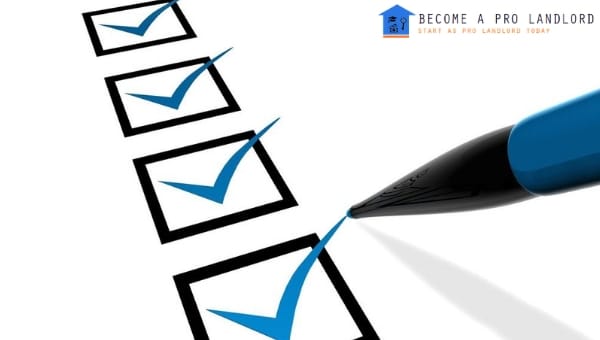First Time Landlord Checklist Before Having Tenants on Property
Renting your property for the first time is an experience in itself. You require to align a lot of ducks in line to get started. For a first-time landlord, this can be both an exciting and intimidating experience at the same time, especially for a DIY landlord. To make this a little easier for you, we have come forward with a first-time landlord checklist before having tenants at the property.
Becoming a Landlord is easy even though you are doing it for the first time. The requirement is that you have the right mindset, good habitable property, and operations set up in place. The first-time landlord checklist will enable you to set up smoothly without breaking a sweat.
The First-Time Landlord Checklist
The Rental Business is much more than just having tenants at your property and collecting rent from them every month. Like any other business, you need to build systems in place to operate this rental property business smoothly and efficiently. Going through the first-time landlord checklist will save you time and your hard-earned money in setting up smoothly.

#1: Ensuring Good Condition of your Property
The first and foremost requirement for any property rental business is to ensure the good condition of the rental property. Your rental property must be in a tenable condition, free from any kinds of harm and damages. Tenants want to rent a house which is in good habitable condition. Work-around improving your rental property and its nearby surroundings. You don`t want to risk a potential prospect even for a minor flaw in your property.
Make sure the property is clean and the fittings and fixtures are in place. You also need to inspect the electrical appliances you are providing on your property. The utilities like the heat, plumbing, and electricity should be working properly and should need no repairs. Your tenant needs to have all the utilities in place and work to maintain the quality of their life. Expect good occupancy rates and fast prospect conversions if you maintain your property in the best possible condition. Furthermore, when you rent your property, landlords are legally obligated to maintain a minimum standard of habitability at the property. This is governed by the housing codes of the property.
Read: Does Your Rental Property comply with the Housing Codes?
#2: Setting Up A Different Phone Number
Being a landlord, you need to have an additional phone number to take all your business-related calls during work hours. It is important you set up a different phone number other than your personal number. Using your personal number for running a business makes no sense. It can trouble you in maintaining a good work-life balance. Getting prospects or tenant calls on your personal number can ruin your personal life.
The prospects and the tenants can call you anytime without even bothering about your comfort and work hours. Your prospect may call you during your holidays or during non-working hours to show the rental property. The tenants can call you any time of the day if they ever experience any hassle during their stay. You’re a landlord and are running a business here. Neither, do you want to mess up your personal life or your business life? So, it is best to keep both of them separate.
#3: Incorporating your Rental Business

Business incorporation is an important step that a landlord should consider taking on an immediate basis. It is one important step in the direction of protecting your business and your assets. Incorporating your rental business gives your business a sole identity. Your new business now becomes liable for any unfortunate event with your tenants and visitors to the property.
Not incorporating it exposes you to personal liability and your personal assets to settle amounts incurred in such events. You can get into legal troubles, huge debt, or maybe even bankruptcy as amounts in such settlements are very high. But if you have an incorporation, this means your business is now liable and your personal assets are safe.
An LLC Incorporation may not be for everyone. Buy an Umbrella Policy at the minimum
Furthermore, by running your business as an incorporated business; you can take various deductions in tax. You can easily deduct a lot of your expenses from your taxable income which isn`t possible in the earlier case. Incorporating your business, however, includes high costs and lots of paperwork. But you didn’t want to become liable if anything goes wrong in your business.
#4: A Separate Bank Account for Rental Business
When you are doing a business, it is important to have a separate bank account. And you should not use your personal account for business-related transactions. Being a full-time business, you need to treat it as a separate entity. It becomes very difficult to manage your funds if you take the business payments in and out of your personal account. Good accountability is very important for having a sustainable business. You should have a record of all the transactions in your business. And the only way to do it is by having a separate bank account.
Furthermore, it becomes easy for you to manage the cash flow and keep the amount for necessary business expenses. You will be able to manage your funds in a better way. The tax filing becomes smooth if you have a dedicated account for your rental business. Also, you can save yourself from the hassles if you ever get audited. You can quickly show this separate bank account statement and limit your interaction with the government authorities.
#5: Buying the Right Landlord Insurance
You need to have landlord insurance to cover yourself from any kind of financial setback due to your rental property. With the landlord insurance, you are covered against defects due to short circuits, fire, earthquakes, storms, lightning, and flood. You can further opt to cover damages by tenant, terrorism, and burglary. Generally, a landlord insurance policy is made to cover your rental property`s structure and its contents from all kinds of possible harm.
Additionally, you can include covers that protect you against loss of income in case your property gets damaged. Right landlord insurance must include a liability insurance cover that can cover costs of legal hassles involved between the landlord and the tenant. If you are found liable for any harm to your tenant due to your negligence, a liability insurance cover will save you from the cost incurred in settling such issues.
Read: What Covers you must-have in your Landlord Insurance Policy?
#6: Prepare a solid Marketing Strategy

The competition is all-time high and the prospects have thousands of options to choose from. So, it becomes important you set up a marketing strategy that stands out your property. Everybody today wants convenience. And being in the digital age, prospects mostly search for their new rented home online. They want to have precise details of the property they are going to rent out. So, it becomes important for you to list your property online with all details like the area, amenities, location, etc.
Include professional photographs and a virtual tour of your property to make your listing stand out from the rest. Not only the listing but your behavior and communication skills also matter when you interact with a potential prospect. You have to be helpful and courteous. You should be able to convey to your prospects that you’re going to be a good host and not just another landlord. The successful landlord doesn’t mind going the extra mile to help their tenants.
#7: Set up a Rental Application
The Rental application is important to have the right tenants to stay at your property. It helps you run a background check on potential tenants. You can obtain their income report, employment history, earlier occupation details, bankruptcy, and past eviction if any from the rental application. Doing this provides you with the tenant`s complete details and you can enjoy hassle-free tenancy on your property. It saves you and your property from any potential damage that can cause you to lose your money.
Setting up a rental application for tenants will help you better understand your tenants. Your tenant must adhere to your guidelines, live peacefully with other tenants, and should pay timely rent. Before having the tenants on your property, you must evaluate them being financially and socially capable of living on your property. And, if you find any problem with the tenant`s rental application, you can simply reject them.
#8: Prepare an Enforceable Rental Agreement
After you receive a filled rental application from the tenant, you are required to have a rental agreement. The rental agreement clearly specifies the legal terms and conditions of staying on the property. This legal agreement binds both parties i.e. the landlord and the tenant under certain guidelines and set responsibilities. Also, the rental agreement serves as an important document during any conflict between you and your tenant.
The rent agreement includes the details of the duration of the tenant`s stay, the rent amount, and the security amount with the landlord. Also, having a rental agreement is important for a smooth relationship between the tenant and the landlord. Once both the parties enter into a written agreement, the terms and conditions become legally implied. It can`t be changed until both parties mutually agree to it. Moreover, the rent agreement sets the expectations of the tenant of what they can expect from the landlord in terms of the duty and responsibilities of a landlord.
Don`t use just any Rental Agreement. Use a State-Specific Legal and Enforceable Agreement
#9: Set up a Security Deposit Protection
A tenant pays a refundable security deposit to stay on your property. Securing this security amount is legal responsibility of the landlord and an entrusting factor towards the tenant. Collecting a security deposit ensures that your tenant will keep your business free from all kinds of liabilities and damages. However, this security amount has to be refunded when the tenant handover a peaceful possession. And strictly, the security deposit has to be used only in case of damages or violation of the agreement by the tenant. This can be exercised only by giving written legal notice to the tenant.
The security amount is refundable and hence is not the property of the landlord. The landlord is not authorized to use it under normal conditions. According to law, you have to keep this deposit amount in a separate bank account and return this deposit once the tenant moves out of the property. You can even use a security deposit escrow account for this purpose. The escrow account is a good option to keep the amount safe for both parties. So, either set up an escrow account or keep this deposit safe in a separate bank account.
Read: The Guide To Collect Security Deposits in a Legal Manner
#10: Prepare A Move-in and Move-out Checklist Document For the Tenant
It is important for you to prepare a document that depicts the move-in condition of the property before the tenant occupies your property. You should clearly document the condition of the property and get the same verified with your tenant. Get your tenant to verify it on the same day they move into the property. Verifying it makes them responsible for any negligence and harm they do to your property. This way you can charge them easily for the incurred cost of that specific repair without getting into any trouble.
The move-out document is also important as the move-in document. It indicates levied charges if the tenant fails to give the peaceful possession of the property when they move out. You can deduct those charges from the security amount and hand the remaining to the tenant. Having this document ensures maintained property and smooth possession. A maintained and clean property means you have immediate occupancy by new tenants.
Read: What if the Security Deposit is not enough to repair the Damages?
The Bottom Line
Before having tenants on your property, it is always better you go through the above first-time landlord checklist and set up accordingly. Never let anything go wrong in the way of renting your place.
Found our First-Time Landlord Checklist helpful? Do you have any points worthy to be added to this list? We love to hear your thoughts in the comments section below. And, if you wish to stay connected with us for all the new information related to landlording and managing your real estate business, do subscribe to our newsletter. You can also be a part of our community on Facebook.



[…] can be a nightmare for any landlord out there. It is important you have a tenant background check before they move in to your property. A bad tenant can give you hardships in your landlord business and can create problems for your […]
[…] to rent the property. And if the property you have purchased needs some rehabbing, you should do it before putting the property on rent. Failing to do it, you will have hard time renting your property and converting prospective tenants […]
[…] However, in some states, prorating rent may be required by the law. So, it is always advisable to check the laws of your state before renting to a tenant. […]
[…] on your property and collecting rent every month. Before even putting your property on rent, have proper systems and operations in […]
[…] the move-in condition helps both the landlord and the tenant in case any damage occurs at the rental property. When you […]